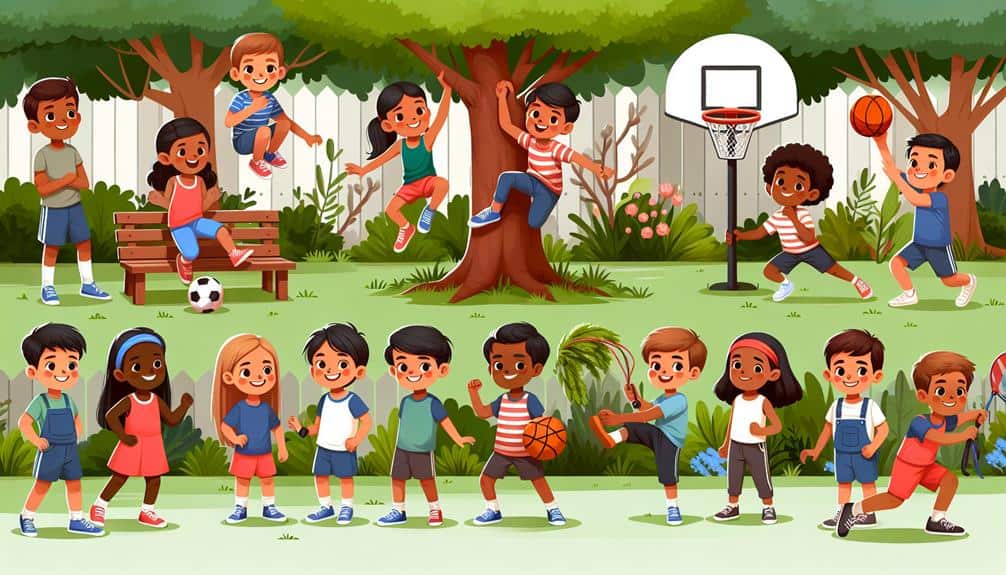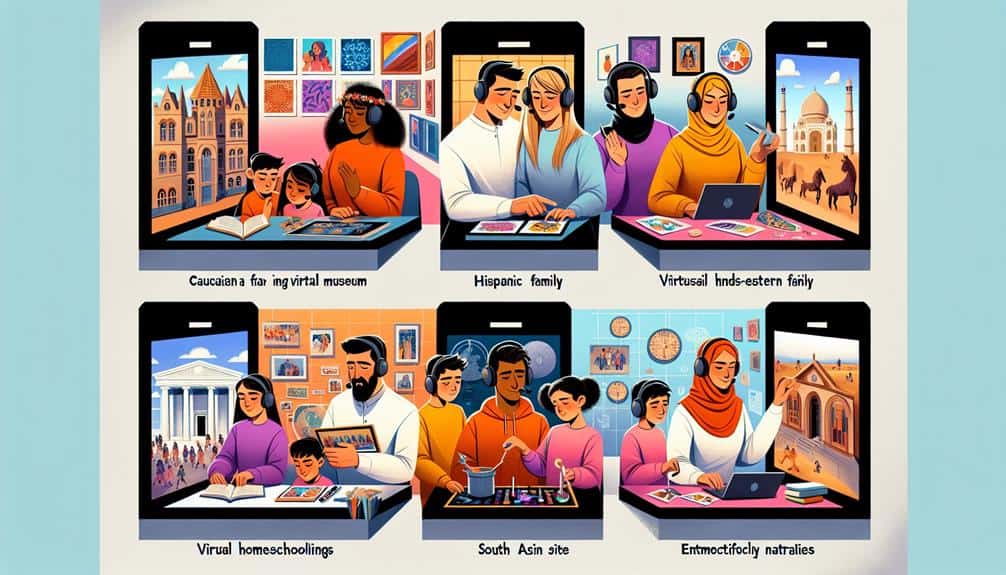Introducing music into your homeschool curriculum infuses joy and growth into your child's education. Enhance cognitive skills, boost memory retention, and stimulate creativity through music. Consider age-appropriate instruments and explore music theory for a well-rounded experience. Engage in fun activities like musical games and DIY instruments to make learning lively. Utilize virtual resources, organize family performances, and create a musical portfolio to celebrate progress. Music in homeschooling cultivates lifelong appreciation, boosts academic performance, and fosters confidence. Harness the power of music to orchestrate a symphony of learning for your children.
Key Points
- Incorporate music across subjects for a holistic learning approach.
- Use music to enhance memory retention and cognitive development.
- Integrate music theory into math or physics concepts.
- Organize music-themed projects for creativity and critical thinking.
- Collaborate with musicians for additional learning opportunities.
Benefits of Music Education at Home
Discover the myriad benefits that integrating music education into your homeschool curriculum can bring to your child's learning experience. Music offers a wealth of advantages beyond just playing an instrument or singing. It plays an essential role in cognitive development, enhancing memory, and stimulating creativity.
By engaging with music, your child's brain is actively involved in processing different sounds, rhythms, and melodies, which can improve their cognitive abilities. Additionally, music provides a unique outlet for emotional expression, allowing your child to convey feelings that they may not be able to articulate verbally. This emotional connection to music can foster empathy and self-awareness in your child.
Memory enhancement is another significant benefit of music education, as learning to play an instrument or memorize lyrics can boost memory retention skills. Moreover, engaging with music ignites creativity, encouraging your child to think outside the box and explore new ways of self-expression.
Embrace the power of music in your homeschool curriculum to access these transformative benefits for your child's holistic development.
Choosing the Right Instruments
Now that you understand the benefits of incorporating music into your homeschool curriculum, let's explore how to select the perfect instruments that will complement your child's learning journey.
When it comes to instrument selection, there are a few key factors to take into account to make the right choice for your child.
- Age Appropriate Instruments: Take into account instruments that are suitable for your child's age. Younger children may benefit from simpler instruments like xylophones or recorders, while older children might be ready for more complex instruments like guitars or keyboards.
- Skill Levels: Keep in mind your child's current skill level. Beginners may thrive with instruments like ukuleles or tambourines, while more advanced students could enjoy learning the violin or drums.
- Budget Considerations: Keep your budget in mind when choosing instruments. There are affordable options available for most instruments, so you can find something that fits your financial constraints while still providing a high-quality learning experience for your child.
Incorporating Music Theory Lessons
Ready to elevate your homeschool music curriculum? Let's talk about incorporating music theory lessons.
By understanding basic music theory principles and applying them practically, you'll be providing a strong foundation for musical growth.
Get ready to reveal the secrets behind the music you love and create!
Basic Music Theory
Immerse yourself in the world of basic music theory as you incorporate engaging and interactive music theory lessons into your homeschool curriculum. Understanding fundamental concepts such as note reading and rhythm patterns forms the foundation for musical proficiency. Here's how you can explore the fascinating domain of basic music theory:
- Note Reading:
Begin by introducing the musical staff, notes, and their corresponding positions. Explore the treble and bass clefs to grasp how notes are represented in different octaves.
- Rhythm Patterns:
Delve into the rhythmic aspect of music by learning about time signatures, note durations, and rests. Practice clapping out different rhythms to internalize these patterns effectively.
- Interactive Activities:
Make learning music theory enjoyable with games like note naming races, rhythm dictation exercises, and creating your melodies. Engaging activities can enhance comprehension and retention.
Practical Applications
Explore the myriad ways in which you can investigate the foundational concepts of basic music theory into real-life musical experiences within your homeschool curriculum. By incorporating music appreciation and interactive activities, you can bring music theory to life for your students.
Consider organizing listening sessions where you explore different genres and styles, discussing how music theory principles are applied in each piece. This hands-on approach will deepen your students' understanding and appreciation of music theory.
In addition, investigate into music history and introduce your students to famous composers. Through studying the lives and works of Beethoven, Mozart, Bach, and other influential figures, your students can gain a richer understanding of music theory in practice.
You can even organize fun activities like composing short pieces inspired by these composers or arranging famous melodies using basic music theory principles.
Fun Ways to Learn Music
Engaging in interactive music games can be a dynamic and enjoyable way for students to explore rhythm and melody while having fun learning music.
Immerse yourself in a world of musical discovery with these exciting activities:
- Musical Chairs Remix: Spice up the classic game of musical chairs by playing different genres of music. When the music stops, discuss how the tempo and mood of each genre make you feel.
- DIY Instrument Making: Get creative with household items to craft your own instruments. From rubber band guitars to oatmeal shaker drums, let your imagination run wild while exploring sound production.
- Lyric Scavenger Hunt: Search for song lyrics around your home or neighborhood. Analyze the meaning behind the words and discuss how they connect to your own experiences.
Virtual Music Classes and Resources
Discover a wealth of virtual music classes and resources that can enhance your homeschool curriculum and provide valuable learning opportunities for your students. Online resources offer interactive learning experiences that cater to various musical interests and skill levels. From live virtual music lessons with instructors to interactive music theory games, the online world is brimming with options to engage your students in a dynamic and educational way.
Virtual music classes provide a platform for students to learn from professional musicians and educators without leaving the comfort of their homes. These classes often include live sessions where students can ask questions, receive feedback, and interact with peers, fostering a sense of community and collaboration.
Additionally, online resources such as virtual instrument simulators, music composition software, and digital sheet music libraries offer hands-on learning experiences that complement traditional music education methods.
Organizing Family Music Performances
How can you showcase your family's musical talents through organized performances that foster creativity and collaboration?
Family concerts are a fantastic way to bring everyone together and share the joy of music. Here's how you can make these performances memorable:
- Choose a Theme: Selecting a theme for your family concert can add a fun and cohesive element to the event, encouraging creativity in song selection and presentation.
- Assign Roles: Assigning roles such as performers, emcees, and stage crew can help everyone feel involved and responsible for the success of the concert.
- Rehearse Together: Practice sessions not only help in perfecting the performance but also provide an opportunity for family members to bond over music and work collaboratively towards a common goal.
Performance preparation is key to a successful family concert. By organizing these events, you not only showcase your family's musical talents but also create lasting memories filled with creativity and togetherness.
Creating a Musical Portfolio
Crafting a musical portfolio allows you to document and showcase your family's musical journey and achievements in a tangible and organized manner. It serves as a powerful tool for reflecting on progress and growth over time.
Start by organizing your portfolio into sections such as recordings, sheet music, certificates of achievement, and personal reflections. This structure won't only help you keep track of your musical endeavors but also allow for easy showcasing of progress.
Include recordings of performances or practice sessions to capture improvements in technique and expression. Add sheet music to demonstrate the pieces you've mastered or are currently working on. Certificates of achievement from competitions or music exams can be a proud addition, showcasing your dedication and skill development.
Don't forget to jot down personal reflections on each piece or musical experience; it adds a personal touch to your portfolio and helps in tracking your musical growth. By creating a musical portfolio with proper organization, you create a roadmap of your family's musical evolution and celebrate the milestones achieved along the way.
Frequently Asked Questions
How Can I Help My Child Overcome Stage Fright During Performances?
To help your child overcome stage fright during performances, engage in confidence-building activities like role-playing, deep breathing exercises, and positive self-talk. Encourage parental involvement, seek peer support, and practice relaxation techniques for managing performance anxiety.
What Are Some Unique Ways to Incorporate Music Into Daily Routines?
To infuse music into daily life, consider musical storytelling to spark imagination and create connections. Have kitchen concerts while cooking dinner to make mundane tasks fun and memorable. These unique approaches will enhance your family's bond through music.
Are There Online Platforms for Virtual Music Collaboration With Other Homeschoolers?
Explore the world of virtual duet sessions and online jam sessions with other homeschoolers. Engage in your musical talents, connect with like-minded individuals, and create beautiful harmonies together from the comfort of your home.
How Can I Track My Child's Progress in Music Skills Over Time?
To track your child's music progress, consider using regular assessments to monitor skill development and milestones. Keep a journal or portfolio to document achievements, challenges, and improvements over time. Celebrate each step forward!
What Are Some Benefits of Introducing Different Music Genres to My Child?
Oh, the wonders of diving into diverse music genres! Explore cultural appreciation through musical exploration, while boosting cognitive development and emotional expression. Let the melodies take you on a journey of discovery and growth.



